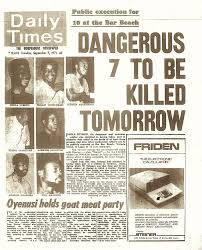By Richard AKINNOLA
In his short story, Cat and Mice, Chinese writer, Lu Xun relates the morbid theatrics of a snake that swallowed a frog and vomited it on each occasion. The embattled frog wished that the cruel joke was quickly over. The frog preferred that the snake swallowed it once and for all.
That aptly epitomizes the travails of condemned prisoners who are kept on the death row for several years without the death sentences being carried out. There have been instances where some of them wait for the hangman for 20 years, with the attendant psychological trauma.

They are deprived of both death and life.
Ensconced in dingy, solitary dungeons, their hearts miss their beats each time a prison warder comes around their cells, holding a sheet of paper. Instinctively, they feel they have a date to keep with the hangman. In most cases, they miscalculate. And the travails continue for years. Life becomes a liability to them. Yet, death has refused to come.

This was the situation that once drew the ire of the Court of Appeal in 1996, in a landmark case that could have fundamentally altered our law, particularly as regards the interpretation of Section 31(1)(a) of the 1979 Constitution that dealt with inhuman and degrading treatment.
Section 31(1) stated: “Every individual is entitled to respect for the dignity of his person, and accordingly (a) no person shall be subjected to torture or to inhuman or degrading treatment.”
It was the case of Peter Nemi V. State which the Supreme Court said raised “a vey far-raching constitutional question.”
The case had moved from the high court, up to Supreme Court and back at the High Court, up to Court of Appeal.
The Appeal Court panel of Justices made up of Justices Sampson Uwaifo, (who read the leading judgment), Justice Rabiu Danlami Mohammed and Justice Emmanuel Olayinka Ayoola, condemned a situation whereby a death sentence convict could be kept for an indeterminable long period.
Mr. Peter Nemi and three others were arrested on September 9, 1982 for armed robbery. They were tried and sentenced to death on February 26, 1986. They went to the Court of Appeal, which dismissed their appeal on March 29, 1990.
However, at the Supreme Court, the matter took a dramatic turn. Peter Nemi’s counsel, Mr. Olisa Agbakoba, raised a novel constitutional point, stating that having been on death row for eight years, coupled with the fact that his trial was delayed, being in custody since 1982 (making 14 years in custody), his ordeal amounted to inhuman and degrading treatment.
His non-execution, he argued, was entirely caused by the due process of law, and that the convicted man did not in any way contribute to the delay, other than to exercise his rights to invoke judicial process.
In view of the importance of the constitutional questions raised, the Supreme Court invited all Attorneys-General of the states and three Senior Advocates of Nigeria (SAN) as amici curiae (friends of the court).
After an exhaustive argument, the Supreme Court confirmed the conviction of Peter Nemi, but held that the Supreme Court had no original jurisdiction to determine the constitutional issues raised by Mr. Agbakoba in respect of the alleged inhuman and degrading treatment meted out to the convict. The Supreme Court said the matter should be filed at the Federal High Court.
At the Federal High court, the court held that it had no jurisdiction to entertain the suit.
But this did not go down well with the Court of Appeal which altered the judicial landscape with its insightful dissection of the inhuman penal system we operate in the country.
Although the Court of Appeal did not pronounce on the substantive issue which had not been canvassed at the lower court, it nonetheless gave a flicker of hope for the reprieve of Peter Nemi and those in similar situations.
Justice Uwaifo noted that novel cases of human rights claims may arise in difficult situations and upon strange facts.
He posited: “It is a challenge to the judiciary, of which the present case might serve as a touchstone. But, the judiciary would hardly be able to cope, going by the circumstances of the time in which it operates, if, on the mere reflection behind dim light, and sighting the shortened form of their silhouette, the judges readily conclude that they had a diminutive stature, which made it too impossible or difficult for them to attempt the job of solving human righteousness of an unusual type.”
Describing as “alarming and perturbing” the submission of government lawyer, that there is no provision in the law that allows a condemned convict to enforce his fundamental human rights after conviction and sentence, Justice Uwaifo asked: “Does it mean that a condemned prisoner can be lawfully starved to death by the prison authorities? Can he be lawfully punished by a slow and systematic elimination of his limbs one after another, until he is dead? Is a condemned prisoner not a person or individual?”
The practical implication of this is that if somebody had been condemned to death by hanging, and somebody else stabs him to death, that person would have committed murder.
While it is taken that Section 30(1) of the 1979 Constitution gave the government the right to execute someone who had been judicially sentenced to death, such decision ought to be carried out expeditiously without infringing on Section 30(1) of the constitution.
Section 30(1) stated: “Every person has a right to life, and no one shall be deprived intentionally of his life, save in execution of the sentence of a court in respect of a criminal offence of which he has been found guilty in Nigeria.”
And Section 42(1) of the constitution states that: “Any person who alleges that any of the provisions of this chapter (Chapter IV) has been, is being or likely to be contravened in any state in relation to him, may apply to a high court in that state for redress.”
It therefore means that if any condemned person complains that his right has been infringed upon by way of inhuman and degrading treatment, he has a right to come to court to enforce such right.
In the present case, the appellant had been on the death row for 10 years, with the attendant psychological torture. He therefore, wanted his death sentence commuted, of which he was entitled.
Although, this was the first time this type of case would come up in Nigeria, if judicial precedents in other lands are anything to go by, Mr. Nemi had a triable case.
The case of Pratt V. A-G of Jamaica (1993) 4 All E.R. 769, which was similar to Nemi’s case, becomes referential here. It had to do with the interpretation of section 17(1) of the constitution of Jamaica, similar to our own section 31(1) of the 1979 constitution. This was before the enactment of the 1999 constitution.
It states: “No person shall be subjected to torture or inhuman or degrading punishment or other treatment.”
The appellants wanted their death sentences commuted, having stayed on the death row for a long period. Lord Friffiths, in his judgment at the Privy Council held: “A state that wishes to retain capital punishment must accept the responsibility of ensuring that execution follows as swiftly as practicable after sentence, allowing a reasonable time for appeal and consideration of reprieve. It is part of the human condition that a condemned man will take every opportunity to save his life through use of the appellate procedure.
“If the appellate procedure enables the prisoner to prolong the appellate hearings over a period of years, the fault is to be attributed to the appellate system that permits such delay and not to the prisoner who takes advantage of it.”
Based on this precedence, there is no doubt that the Court of Appeal was right to holding that the Federal High Court had jurisdiction to determine the case.
The Appeal Court’s decision momentarily altered the equation in the legal algebra of human rights litigations in Nigeria.
As Justice Uwaifo brilliantly postulated, it is not enough for Nigeria to ratify the African Charger on Human and Peoples Rights, we must move with the rest of the human race in the implementation of those rights.
Although, Mr. Peter Nemi had spent 14 years in custody, 10 of which he had spent in the condemned cell, the long period of incarceration may be worth the trouble after all, considering the fundamental issue involved, which was a test case in Nigeria.
Though when the matter went before the Supreme Court, Peter Nemi couldn’t get the court to declare capital punishment as unconstitutional, as the Supreme Court held that death penalty is constitutional because the right to life is qualified and a death penalty is permissible under our constitution.
Nonetheless, the words of Uwaifo, JCA (as he then was), resonated well when he posited: “While the executive may take steps to examine, or to set in motion, ways of improving human rights situation, the judiciary should actively show its impetuous readiness to complement or, indeed, surpass the efforts of the executive by an inspiring judicial approach to or definition and recognition of circumstances of human rights where appropriate and feasible.”
Many years ago, l was once a member of the committee on the prerogative of mercy and throughout our tenure, we never advised the Governor to sign any execution warrant. Some of the death sentences were commuted.


